The gentle swooshing sound of air moving through your HVAC system can be very soothing. Not so much if you start hearing knocking, banging, and rattling. You may also hear squeaking or squealing, clicks, hums, or buzzes.
Every one of those non-normal noises deserves investigation–either by you or an HVAC professional. Some noises will be annoying but relatively harmless. Some noises can be a warning that a more serious problem is starting.
Here are some of the more common noises, their possible causes, and some ways to get them fixed.
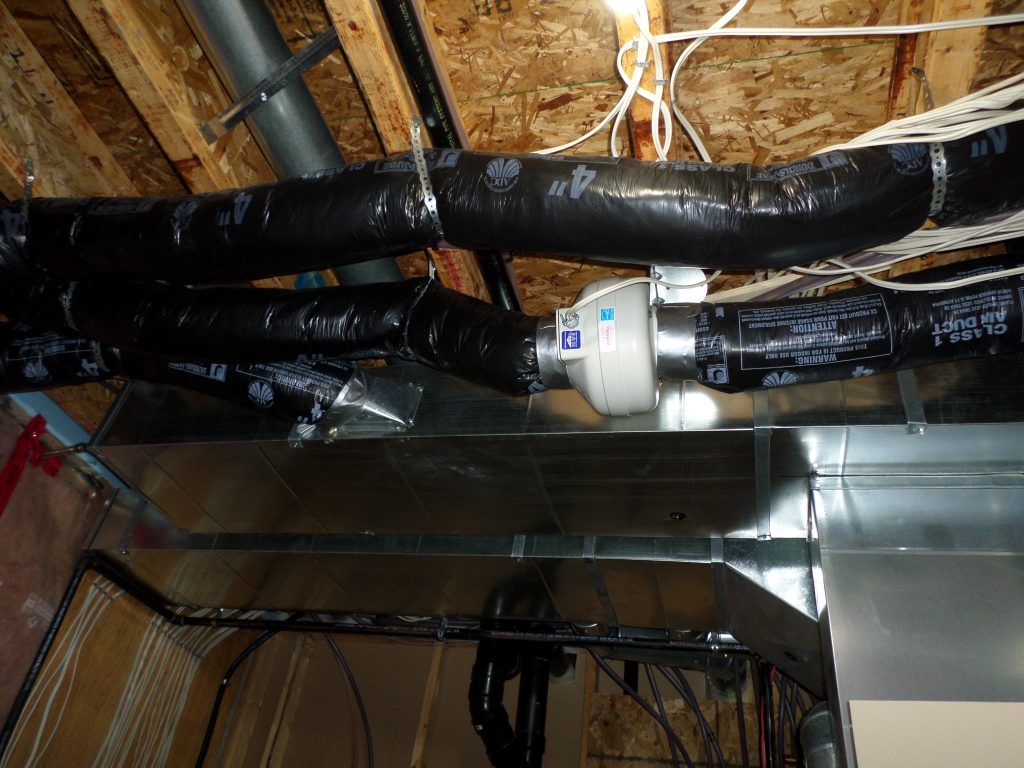
6 Air Vent Noises
The first thing to keep in mind is that most HVAC systems are not like a window air conditioner. They usually resemble an octopus spread all over your house. Meaning that noise coming out of the vents could be originating in the furnace, air conditioner, heat pump, or any of the connecting piping.
1) Change Your Air Filter
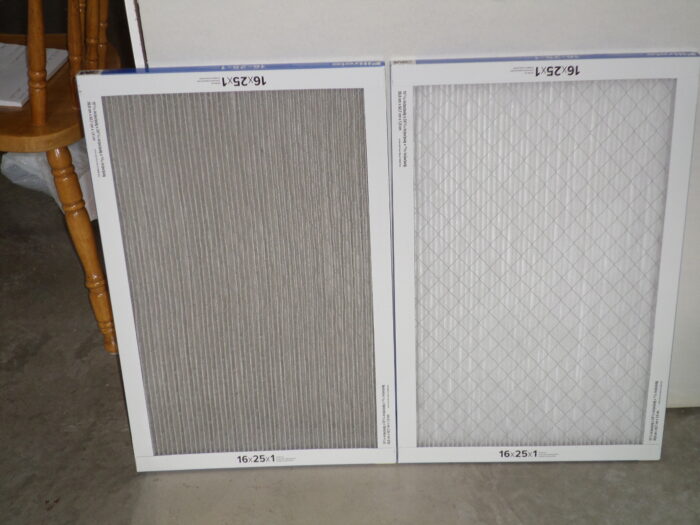 New and Used Furnace Filter
New and Used Furnace Filter
Air filters should be changed regularly to ensure furnace efficiency. A clogged filter makes the entire system work harder because it is not able to get enough return air. A very badly clogged filter may make thumping or buzzing sounds. You may also hear a high pitched whistling noise as the fan tries to suck air through or around the useless filter.
You will see recommendations telling you to change filters every 30, 60, 90 days. This is all pretty subjective and can vary wildly with run times, dirt in the house, and filter type. Cheap fiberglass type filters will need to be changed less than the Filtrete filters we use because they do not stop as much dust, dirt, bacteria, etc.
Some more expensive brands of filters offer an app that will tell you when the filter needs replacement. The apps are free but the filters are more expensive. Generally, you should change the filter if it is difficult to see through or when your wife tells you to change it.
The filter on the right is brand new and un-used. The one on the left has been in our furnace for about 6 weeks. (My wife hasn’t told me to change it yet.)
2) Check the Motors
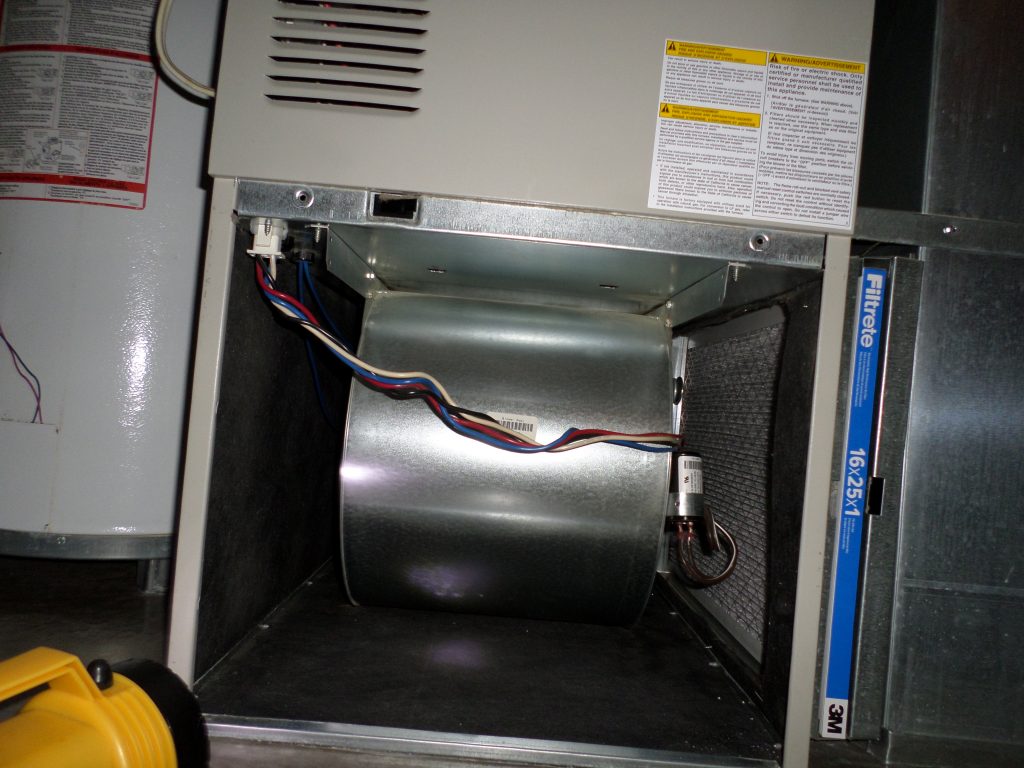
The picture above is of our furnace motor. As you can see, it is difficult to see the motor inside the squirrel cage cover. But you can watch and listen to it run to get some idea of any noise it might be making. HVAC motors tend to last for years–trouble free. But when they begin to wear out, or something else is wrong with them, they will let you know.
- Squealing, Screeching, Grinding. Loose or worn belt. Motor bearing wearing out. Loose pulley.
- Banging or Rattling. Motor and/or squirrel cage blower might be loose on mountings.
- Humming. Could be a motor wearing out.
For more information on quieting HVAC systems please see our articles How to Quiet a Noisy Furnace Blower, and How to Quiet a Noisy Air Return.
3) Make Sure the Vents are Clear
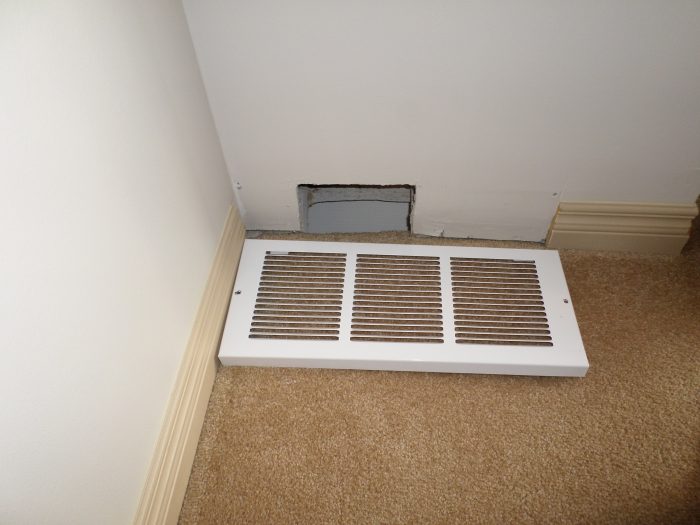
Efficient HVAC systems are designed for the size of area they service. Incoming (or return) air should closely match the amount of air being blown out. Make sure all the air vents are clear. If not, you may hear a howling, whistling, humming sound as the system tries to move air around the house. The noise at the air intakes tends to sound like a high pitched tuning fork type sound.
- Keep Vents Clear. Keep furniture, rugs, shoes, mitts, and everything else off of vents. They need to be clear to work properly and be quiet.
- Open Dampers. Closing off vents in unused rooms sounds like a good idea to direct more warm or cold air into living spaces. It isn’t. Keep all vents at least partially open.
- Open Doors. Many older houses do not have enough return air vents, or they are centrally located in hallways or living rooms. Closing doors to keep the heat in does not work well for the system because it needs return air which is now forced to squeeze under doors.
- Undersized Vent Openings. As shown in the picture of my office return vent, you should check to see if the vent cover actually matches the duct size.
- More Powerful HVAC Systems. Upgrading your system is a great idea for more power and energy efficiency. If you do not also upgrade pipes and vents you are going to hear a lot of strange noises because of a lack of compatibility. Kind of like trying to squeeze into your 20 year old jeans. Incompatible.
4) Inspect Your Ducting
Most HVAC ducting is metal, which expands and contracts as it warms and cools. Pipe joints are sealed with duct tape (the original use) to prevent escaping air and the sounds that go with it. Make sure your joints are still well and truly sealed. If not, re-tape the joints. (Most HVAC systems were installed when the house was built making the duct tape quite ancient in some cases.)
Most air returns are made of wide flat sections of metal that can also make a bonging or ponging noise as it expands and contracts. Many companies are now using products like Thermopan as a lightweight soundproof quiet alternative to metal wherever possible.
There are options to quiet your pipes and ductwork.
- Replace it with flexible pipe
- Install insulation around the pipes
- Install insulating pipe wrap.
- Replace as much metal as possible with Thermopan
All of these are expensive and time consuming. They may only be worth considering if you do not mind the noise and are planning on replacing the entire system.
5) Clean Out the Ducts
You might be surprised at how much noise a loose screw or a Lego piece or a marble can make in a metal pipe as they are blown around or move around due to expansion and contraction. Even pieces of paper will cause a fluttering sound when the air is blowing.
Remove all of your vent covers and take out any foreign objects you can reach. You can use a vacuum to get farther into the pipes and ducting. But for the best cleaning, hire a furnace/HVAC cleaning company once a year to remove any hard objects along with accumulated dust and dirt.
6) Check for Leaking Refrigerant
That hissing and/or bubbling noise coming out of your vents is not a good sound. It is probably connected to leaking refrigerant–from the coolant lines or valves. It may also be telling you that your compressor is in need of help.
Unless you have more than a nodding acquaintance with HVAC systems, repairing coolant leaks and/or compressor problems is best left to professional.
Other Noise-Making Issues
Here are a few more possible problems. They are fairly rare, but still annoying.
- Electrical Control Problems. If you listen closely when the air cuts in or out, you may hear a single click from the relay or thermostat. Hearing a continuous series of clicks probably means there is something wrong with the relay. It usually cannot be repaired and should be replaced.
- Compressor Problems. Hissing, humming, and/or grinding noises could mean your compressor needs help. Depending on where you live, anyone handling refrigerants may need to be licensed or have a certificate. Make sure your HVAC service person has one.
- Non-HVAC Noises. Not all noises you hear are necessarily caused by your HVAC system. (For instance, one of our water pipes came loose and started tapping on our bedroom heat duct every time the kitchen tap was turned off.) Keep an open mind when doing your inspection.
Call an HVAC Professional
If you are not sure of your own abilities, or just don’t want to bother, make sure you call a professional to inspect your HVAC system. Although ducts flexing and booming are annoying, they are not necessarily serious. Loose belts, overheating motors, and leaks can be dangerous and expensive.
Preventive Maintenance
Regular maintenance and system checks should help prevent noise coming through the air vents, and maybe catch problems before they become serious. Things to do:
- Keep all vents clear of furniture, rugs, and toys
- Change filters regularly (Some of the better filters even come with an app to let you know when.)
- Check motors and belts for tightness and wear
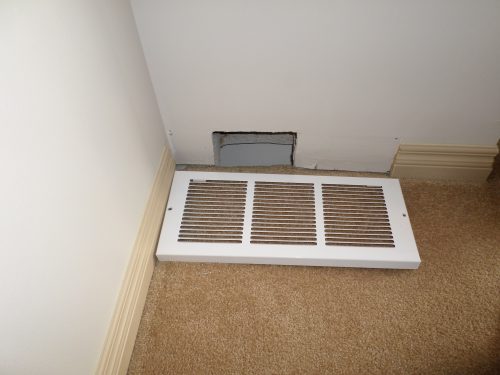

The vent in the bedroom has a scurrying noise – like bugs or something moving around.
I opened the vent and I swear a less than penny size brown bug scurried out. I pushed it lightly and it went back in vent. No more scurring noise?
I’m afraid of what might live down there.
And with all the white powdery crap that comes out all of furniture – it seems to be sticky on the mirrors. Mirrors are gross and furniture too.
We put in a new softwater deal in. Just had all the ducts blown.
Could something b e living in there.
How big is a bed bug or something else in there.
Can you help. It is driving me nuts. Husband hardly reacts to anytrhing – I CATCH EVERYTHING.